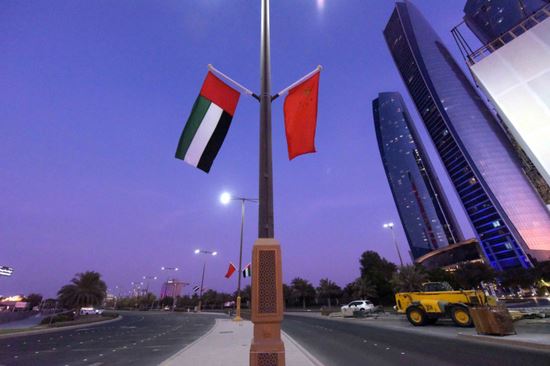
By China News Service Reporter Xiao Xin
In recent years, high-level exchanges between China and the United Arab Emirates (UAE) have become closer, and political and strategic mutual trust has continuously deepened, with deepened bilateral cooperation in various fields. As comprehensive strategic partners, China and the UAE share similar development paths, concepts, and goals, which together provide some reference for developing countries to explore modernization independently.
Dr. Ali Obaid Al Dhaheri, UAE Ambassador to the People's Republic of China, explained in an exclusive interview with China News Service's W.E. Talk how China and the UAE can find a balance through cross-cultural exchanges and cooperation in various fields to achieve win-win results, as well as cooperate more deeply with fruitful results from the Belt and Road Initiative (BRI) to bring the UAE new momentum for its next 50-year strategy and mutual benefits for both countries.
Below are excerpts from the interview.
China News Service Reporter: In recent years, high-level exchanges between China and the UAE have become closer, and political and strategic mutual trust has continuously improved. In 2012, the UAE became the first Gulf Arab country to establish a strategic partnership with China. In 2018, China and the UAE forged a comprehensive strategic partnership. In 2019, during the state visit of President His Highness Sheikh Mohamed bin Zayed Al Nahyan, he commented that the UAE’s foreign policy will continue to place a priority on deepening its comprehensive strategic partnership with China and that the UAE is confident about China’s development. He stressed that his country will always be China’s best strategic cooperative partner no matter how the international situation changes. Why does the UAE value China as a friend?
Ali Obaid Al Dhaheri: The UAE values China as a trusted friend as we share similar values and perspectives in key areas. During past decades, both the UAE and China have experienced rapid economic growth and social development, indeed we could say both of our countries have undergone transformations. Both our countries are strongly committed to multilateralism, peace and stability. Importantly, we both prioritise the future, being energetic with planning and implementation of a better future based upon innovation and the provision of higher qualities of life for our people. Importantly, our governments and people have common affinities, which have fostered a broad range of people-to-people contacts. These are the foundations upon which trust quickly grows and flourishes.
Accordingly, the two countries cooperate each other on issues involving our core interests and major concerns. Both sides have developed bilateral relations based on mutual respect and understanding. The UAE is committed to safeguarding regional prosperity and stability, while China is also playing an increasingly important role in international affairs. As mentioned, both countries share the same vision for the future development of the world and mankind.
This year is the 38th of establishment of diplomatic relation for UAE and China, both countries have been making great progress in exchanges across many fields such as the economy, politics, culture, science, and technology. At present, the UAE is committed to transforming from an oil-based economy to a knowledge-based innovation economy, while China is a leader globally in new energy, infrastructure, life sciences, artificial intelligence, amongst others. For all these reasons I have outlined, it is important for the UAE to develop friendly relations with China. On the 50th anniversary of the founding of the UAE in 2021, the UAE launched a very ambitious industrial strategy for the next 50 years, “Operation 300 billion”, a plan for a transformation of the manufacturing sector. The objective is no less than to reshape UAE as a world-class industrial nation. These goals have much in common with China's 14th Five-Year Plan and China’s goals for 2035 so we should expect that there will be rich opportunities for dual cooperation.
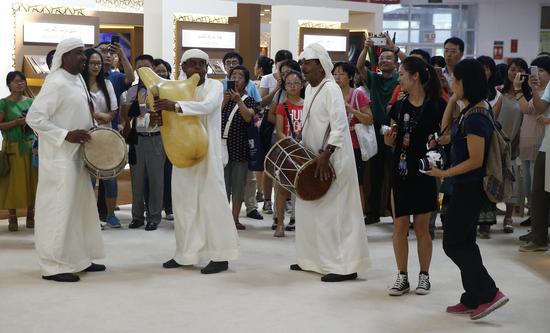
Shared goals and visions make the UAE value China very much.
China News Service Reporter: During his visit to the UAE in 2018, Chinese president Xi Jinping pointed out that our two countries are geographically far apart and different in national conditions. But we are both proud to have an enterprising and creative people who never give up their dreams. Similarly, the founding father of the UAE, His Highness Sheikh Zayed bin Sultan Al Nahyan, aptly noted that oil alone cannot bring progress to a country and that it must be combined with the hard work of its people. How can the two countries find a balance between mutual learning and win-win benefits under their background of different cultures, systems, and national conditions? What are their common cultural concepts and spiritual cores?
Ali Obaid Al Dhaheri: People from our two countries are talented, hardworking and creative, and determined to progress themselves and their country. The UAE was founded on the principles of tolerance, equality, generosity, and innovation, which coincides with Chinese classic ideas such as inclusiveness, integrity, and innovation. There are more than 200 nationalities living and working in the UAE. The expatriate community outnumbers the population of UAE nationals.
As the representatives of two major civilizations, both countries have actively promoted peaceful coexistence with all countries in the world. In 2020, the UAE normalized relations with Israel, which reflects its firm attitude in upholding human values, coexistence, and unity on the basis of tolerance. The UAE is committed to promoting regional stability and safeguarding world peace. As a permanent member of the UN Security Council, we note that China has promoted regional and global peace and stability while unswervingly following the path of peaceful development.
For 2022-2023 the UAE is a non-permanent member of the UN Security Council. We will firmly work with China and all members to strengthen multilateralism and contribute constructively to the efficiency and effectively to the operations of the security council.
Both countries, as open and free economies, have a high degree of complementarity. China is the UAE’s leading trade partner, while the UAE is China’s biggest trade partner in the Middle East and North Africa region. The UAE and China have pledged to deepen economic and trade cooperation continuously and have a goal of reaching USD 200 billion in bilateral trade by 2030; a four-fold increase from the present USD 50 billion.
Therefore, equality and mutual trust in politics, shared benefits, and win-win situations for our economies and trade, as well as common historical and cultural features, are where our two countries can seek mutual benefits; a win-win result.
China News Service Reporter: The joint development of the BRI has become a bright spot for cooperation between China and the UAE. The UAE is one of the first Arab countries to join the project. From the ancient Silk Road to BRI, why does the Arab world value economic, trade, and cultural exchange with the East? During these joint efforts, how has the UAE’s partnership with China been consolidated?
Ali Obaid Al Dhaheri: Arab countries and China have maintained good trade exchanges since ancient times. The Silk Road started two thousand years ago. Then, the lands of the Arabian Gulf served as a bridge between the Arab world and China, closely linking China in the East together with Arab countries in the West.
Now China has been successful in reincarnating a modern Silk Road in the form of the Belt and Road Initiative. Since the founding of the People’s Republic of China, the country has reached many milestones and become the second-largest economy in the world. It has the resources and capabilities to launch such a mighty endeavour. As China's comprehensive strategic partner, the UAE is an enthusiastic BRI member as it brings great opportunities for the UAE and many other countries.
As one of the first countries to join the BRI, the UAE actively participates in joint development. Our country is now the major BRI logistic hub for the Middle East and North Africa region. UAE was a founding member of the Asian Infrastructure Investment Bank (AIIB) and we aim to mobilize the bank to promote sustainable infrastructure development in Asia and beyond.
During the COVID-19 pandemic, I have been very impressed by the mutual support between both countries. President His Highness Sheikh Mohammed bin Zayed Al Nahyan stressed that he will support China's anti-epidemic efforts immediately, and the UAE government and has repeatedly provided medical materials to China. The world's tallest building, Burj Khalifa Tower, and other UAE landmarks were illuminated as a tangible gesture of support and to cheer for Wuhan and China. In November 2020, several government officials, including the Vice President of the UAE, took a lead in receiving China's vaccines. In December 2020, the UAE became the first country to approve the listing of Chinese COVID-19 vaccines. In the first half of 2021, trials jointly operated by the UAE’s Group 42 and China’s Sinopharm launched the first COVID-19 vaccine production line in UAE. This was the first "made-in-UAE" COVID-19 vaccine line, which promotes the UAE's "leading vaccination program" in 205 medical centers across the country. On December 27, 2021, the Health Ministry of the UAE approved the emergency use of a new recombinant protein vaccine manufactured by China’s Sinopharm. This event again demonstrated the UAE's vote of confidence in China's vaccine.
China News Service Reporter: On the occasion of celebrating the 50th anniversary of the founding of the UAE, the UAE put forward its development vision for the next 50 years. Along with China's BRI and all-around cooperation and communication in various fields, how will this new roadmap affect the development of the UAE?
Ali Obaid Al Dhaheri: The UAE has formulated its UAE Centennial 2071 strategy for the next 50 years. On this basis, we will strive to build up a "kindness-ruled government" with an emphasis on scientific and technological innovation and leading high quality education, making the UAE one of the best economies and creating a happy and cohesive society.
China is the UAE’s largest trading partner and has also accumulated long-term and close cooperation in science and technology with the UAE. I believe that in the future, our two countries can inject even stronger impetus into cooperative development of scientific research, technology, and innovation.
For example, both two countries have similar ambitions in space exploration. The UAE is the first Arab country to implement a space program. China has made remarkable achievements in the aerospace sector. In particular, the recent successful extravehicular flight of Chinese astronauts shows China's increasingly mature technology in manned aerospace. I think the two countries will have extensive latitude for cooperation in the aerospace field. Moreover, the UAE has cooperated with Huawei to become the first Arab country to deploy 5G networks. Our goal is to achieve 100 percent 5G coverage by 2025. We can also cope with more global challenges, such as climate change, desertification control and environmental protection.
For the next 50 years, the UAE will work with China to deepen cooperation in various fields within the framework of the comprehensive strategic partnership. Focusing on the BRI, we will to contribute more to common prosperity. Let the people of our two countries join hands together for a better future! (Full Text)
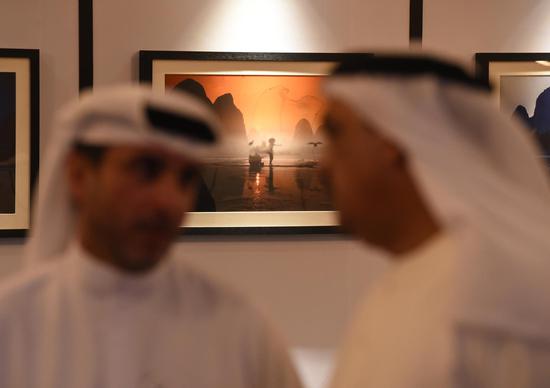
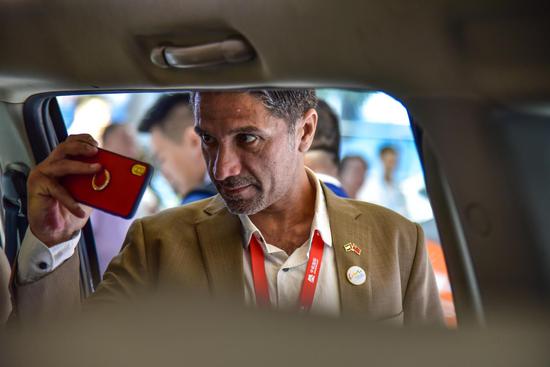

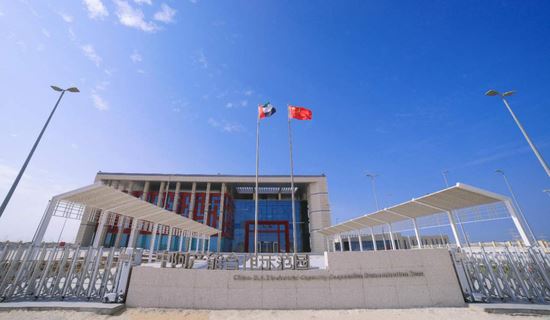
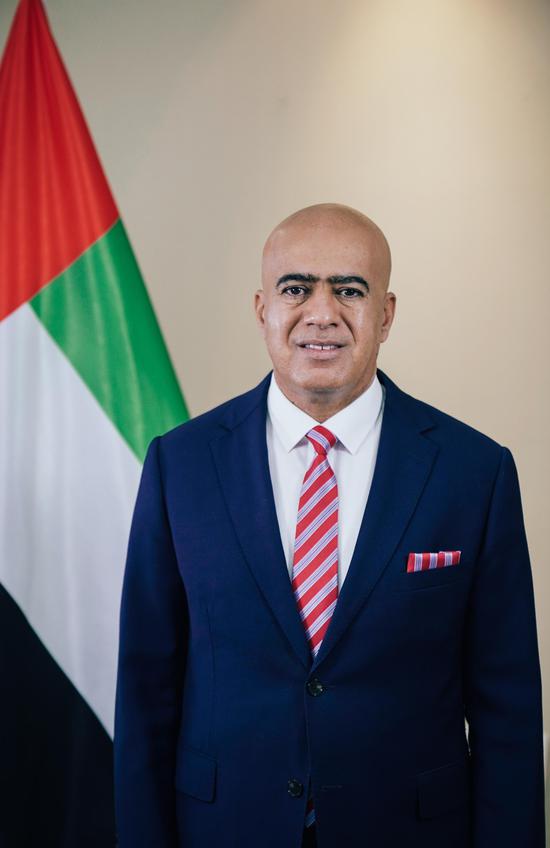
Interviewee Background:
Dr. Ali Obaid Al Dhaheri, the UAE Ambassador to the People's Republic of China, took office in Beijing in October 2017. Throughout his career, he held a wide range of senior positions. He was appointed as the UAE governor of the organization of Petroleum Exporting Countries (OPEC) in October 2009 and the chairman of the OPEC board in 2014. Al Dhaheri received a doctorate in maritime law from the University of Tasmania, Australia, an MBA from Southeast University, and a Bachelor's degree in economics and political science from South Indiana University, United States.